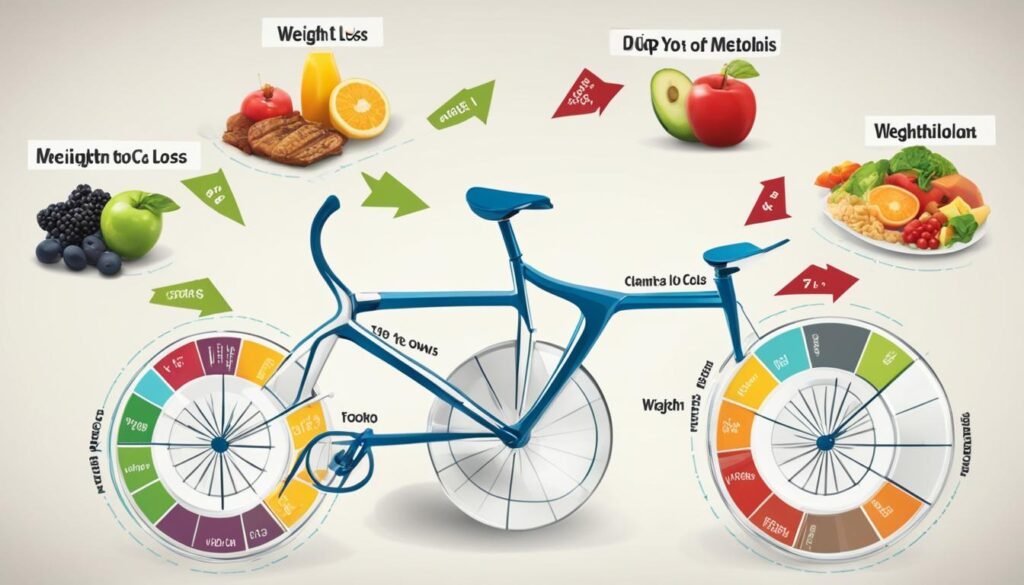Are you tired of the never-ending cycle of yo-yo dieting? Do you find yourself losing weight only to gain it all back, time and time again? You’re not alone. Yo-yo dieting, also known as weight cycling, is a common struggle for many individuals seeking sustainable weight loss (check out my post on sustainable weight loss here).
Yo-yo dieting can have negative effects on both your physical and mental health. It’s time to break free from this cycle and find effective strategies for long-term weight management. In this article, I will share tips and steps to help you overcome yo-yo dieting and achieve sustainable weight loss (check this post out).
Key Takeaways:
- Yo-yo dieting, also known as weight cycling, involves losing weight only to regain it back.
- The yo-yo effect can have negative effects on your body and mental health.
- Unhealthy weight reduction methods and restrictive diets contribute to yo-yo dieting.
- To prevent yo-yo dieting, focus on healthy weight loss methods and maintaining muscle mass.
- Seeking professional guidance and embracing a balanced approach to eating are essential for breaking the cycle.
Understanding the Yo-Yo Effect
The yo-yo effect, also known as weight cycling, is a common phenomenon that involves a cyclic pattern of weight loss and weight regain. This pattern resembles the up-down motion of a yo-yo, hence the name. Yo-yo dieting is often the result of unhealthy weight reduction methods, such as inappropriate dieting and lack of exercise.
This vicious cycle can have detrimental effects on both the body and mental health. When individuals engage in extreme or unsustainable dieting practices, it can lead to impaired metabolic function. This means that the body’s ability to burn calories efficiently is compromised, making it harder to lose weight and maintain a healthy weight in the long run.
Furthermore, the yo-yo effect can cause an increase in fat storage and a decrease in muscle mass. This can be problematic as the loss of muscle mass can further slow down the metabolism, perpetuating the cycle of weight gain and loss. This fluctuation in weight can also negatively impact mental health, leading to feelings of frustration, failure, and a negative body image.
| Impact on the Body | Impact on Mental Health |
|---|---|
|
|
It is important to break free from the yo-yo effect and establish a sustainable approach to weight management. This involves adopting healthy and balanced eating habits, engaging in regular physical activity, and prioritizing overall well-being. By understanding the negative impact of the yo-yo effect and taking steps to prevent it, individuals can achieve long-term success in their weight loss journey and maintain a healthy body and mind.
Causes of the Yo-Yo Effect

The yo-yo effect, also known as weight cycling, can be attributed to various factors. Understanding these causes is essential for breaking the cycle of yo-yo dieting and achieving sustainable weight management. Some common causes of the yo-yo effect include:
- Unhealthy weight reduction methods: Engaging in unhealthy weight loss habits, such as relying solely on restrictive diets or weight loss pills, can increase the likelihood of experiencing the yo-yo effect. These methods often focus on quick fixes rather than long-term lifestyle changes, making it difficult to maintain weight loss.
- Calorie restriction: Diets that involve severe calorie restriction can lead to rapid weight loss. However, this approach often results in a decrease in muscle mass and a slowdown in metabolism. As a result, the body becomes more efficient at conserving energy, making it challenging to sustain long-term weight loss.
- Fasting diets: Fasting diets, such as intermittent fasting or extended fasting periods, have gained popularity for their potential weight loss benefits. While these diets may lead to initial weight loss, they can also cause metabolic changes that contribute to the yo-yo effect. The body’s metabolic rate may decrease during periods of fasting, making it harder to maintain weight loss once normal eating patterns resume.
By recognizing these causes, individuals can make informed choices about their weight loss strategies and adopt approaches that promote long-term success.
The Impact of Unhealthy Weight Reduction Methods
Unhealthy weight reduction methods not only contribute to the yo-yo effect but can also have detrimental effects on overall health. These methods often prioritize rapid weight loss over sustainable practices, which can lead to negative consequences such as:
- Loss of muscle mass: Severe calorie restriction and inadequate nutrient intake during weight loss can result in the loss of muscle mass. This can negatively impact metabolism and make it harder to maintain weight loss in the long term.
- Slowed metabolism: When the body experiences a significant decrease in calorie intake, it may respond by slowing down metabolism to conserve energy. This can make weight loss more challenging and increase the likelihood of weight regain.
- Nutrient deficiencies: Unhealthy weight reduction methods often involve restrictive diets that may not provide the body with essential nutrients. This can lead to nutrient deficiencies and negatively affect overall health.
“Choosing sustainable, balanced approaches to weight loss is crucial for maintaining long-term success and overall well-being.”
Incorporating healthy and sustainable strategies, such as a balanced diet and regular exercise, can help individuals break free from the yo-yo effect and achieve long-term weight management.
| Causes of Yo-Yo Dieting | Impact on Weight Management |
|---|---|
| Unhealthy weight reduction methods | Loss of muscle mass, slowed metabolism, and nutrient deficiencies. |
| Calorie restriction | Decreased muscle mass, metabolic slowdown, and challenges in sustaining weight loss. |
| Fasting diets | Metabolic changes, slowed metabolism, and difficulty in maintaining weight loss. |
Preventing the Yo-Yo Effect
To prevent the yo-yo effect and achieve lasting weight loss, it is important to follow a healthy and sustainable approach. Here are some tips:
- Reduce body fat while maintaining muscle mass: Focus on losing fat rather than just dropping numbers on the scale. Incorporate strength training exercises to preserve and build lean muscle mass while losing body fat.
- Avoid skipping meals: Skipping meals can lead to overeating later in the day. Instead, opt for regular, balanced meals and snacks to keep your metabolism stable and prevent excessive hunger.
- Restrict diet intake sensibly: Adopt a sensible approach to your diet by choosing nutrient-dense, whole foods. Avoid strict, restrictive diets that limit certain food groups or drastically reduce calorie intake, as they often lead to unsustainable weight loss.
- Eat more low-calorie foods: Incorporate plenty of fruits, vegetables, and whole grains into your meals. These foods are low in calories but high in fiber, vitamins, and minerals, keeping you full while supporting overall health.
- Avoid high-calorie and fatty diets: Minimize the consumption of high-calorie and fatty foods, such as fried foods, sugary snacks, and processed treats. Opt for healthier alternatives, such as baked or grilled options.
- Engage in regular exercise: Exercise is crucial for weight loss and weight maintenance. Incorporate a combination of cardiovascular exercises, strength training, and flexibility exercises to promote fat loss, maintain muscle mass, and boost overall fitness.
- Keep a diary of daily diets and weight reduction trends: Tracking your daily intake and weight trends can provide valuable insights into your eating habits and progress. It can help identify areas of improvement and support better long-term success in weight control.
- Consult with nutritionists and dieticians: Seeking professional guidance from experts in nutrition and dietetics can provide personalized recommendations tailored to your specific needs. They can help develop an individualized plan, offer ongoing support, and ensure a healthy and sustainable weight management program.
By following these tips, you can prevent the yo-yo effect and embark on a journey towards healthy weight loss and long-term weight management.
Overcoming Yo-Yo Dieting

Overcoming yo-yo dieting requires adopting sustainable weight loss methods (check this post out). Instead of making drastic changes all at once, focus on making small changes over time. These small changes can make a big difference in achieving long-term weight loss and maintaining a healthy weight. However, it’s important to remember that self-discipline is key to success.
Changing eating habits and sticking to a healthy lifestyle requires self-discipline and long-term commitment. It’s not about following fad diets or quick fixes, but rather about making sustainable lifestyle changes. By prioritizing healthy eating habits, regular exercise, and self-care, you can break the cycle of yo-yo dieting and achieve lasting weight management.
To overcome yo-yo dieting and achieve sustainable weight loss, focus on the following:
- Healthy Eating Habits: Incorporate nutrient-rich foods into your diet, such as fruits, vegetables, lean proteins, whole grains, and healthy fats. Avoid highly processed foods, sugary beverages, and excessive amounts of added sugars and fats.
- Regular Exercise: Engage in regular physical activity that you enjoy. Find activities that fit your lifestyle and schedule, whether it’s walking, jogging, cycling, swimming, or participating in fitness classes. Aim for at least 150 minutes of moderate-intensity exercise per week.
- Self-Care: Take care of your overall well-being by managing stress, getting enough sleep, and practicing relaxation techniques. Prioritize self-care activities that help you relax and reduce anxiety, such as meditation, yoga, or spending time in nature.
Remember, sustainable weight loss doesn’t happen overnight (see my post here). It’s a gradual process that requires patience and perseverance. By making small changes and staying committed to a healthy lifestyle, you can overcome yo-yo dieting and achieve long-term weight management.
Testimonials:
“I used to be stuck in a cycle of yo-yo dieting, but once I started making small changes and focusing on sustainable habits, everything changed. Now, I feel healthier and happier than ever before!” – Sarah
“Overcoming yo-yo dieting was a challenge, but with self-discipline and a balanced approach to eating, I was able to break free from the cycle. It’s all about making small, consistent changes for lasting results.” – Mark
Small Changes for Sustainable Weight Loss
| Small Changes | Results |
|---|---|
| Incorporating more fruits and vegetables into meals | Increased nutrient intake and weight management |
| Choosing water over sugary beverages | Reduced calorie intake and improved hydration |
| Adding physical activity to daily routine | Improved fitness levels and calorie burning |
| Practicing mindful eating | Heightened awareness of hunger and fullness cues |
| Planning meals and snacks in advance | Enhanced portion control and reduced impulsive eating |
The Negative Impact of Yo-Yo Dieting

Yo-yo dieting, also known as weight cycling, can have detrimental effects on both physical and mental health. Let’s explore the negative consequences of yo-yo dieting and the impact it can have on various aspects of our well-being.
1. Impaired Metabolic Function
Yo-yo dieting can disrupt metabolic function, making it harder for the body to lose weight and maintain a healthy weight. When we undergo frequent weight fluctuations, our metabolism can become sluggish, leading to difficulties in achieving sustainable weight loss (see my post here).
2. Increased Risk of Eating Disorders
Repeated cycles of yo-yo dieting have been associated with an increased risk of developing eating disorders, such as anorexia or bulimia. The constant pressure to lose weight quickly and the obsession with restrictive eating patterns can trigger disordered eating behaviors, negatively impacting our mental and emotional well-being.
3. Health Risks of Visceral Fat
Visceral fat, also known as abdominal fat, is the fat that surrounds our internal organs. Yo-yo dieting has been linked to an accumulation of visceral fat, which poses numerous health risks. Excess visceral fat is associated with an increased risk of heart disease, stroke, type 2 diabetes, and other chronic health conditions.
| Health Risks of Visceral Fat | Description |
|---|---|
| Heart Disease | Visceral fat releases inflammatory substances that can lead to heart disease. |
| Stroke | Visceral fat increases the risk of developing blood clots that can lead to strokes. |
| Type 2 Diabetes | Visceral fat interferes with insulin production and increases insulin resistance. |
It is clear that yo-yo dieting can have severe implications for our health. Adopting sustainable weight loss strategies and focusing on overall well-being is crucial to avoid the negative consequences associated with weight cycling (check this post out).
By understanding the harmful effects of yo-yo dieting, we can make informed choices and work towards achieving long-term weight management and overall health.
The Role of Metabolism in Yo-Yo Dieting

Yo-yo dieting can have a significant impact on metabolism, leading to a phenomenon known as metabolic adaptation. Metabolic adaptation refers to the body’s response to weight loss by slowing down metabolism, which can make it harder to lose weight and maintain weight loss over the long term.
Research has shown that the metabolic adaptation experienced during weight loss can persist for years, even after individuals have successfully maintained their weight loss. This adjustment in metabolism can pose challenges for those seeking long-term weight management.
To combat metabolic adaptation and support sustainable weight loss, a multifaceted approach is necessary (check this post out). It starts with mindful eating, which involves paying attention to hunger and fullness cues, choosing nutrient-dense foods, and practicing portion control. By nourishing the body with a balanced and varied diet, individuals can support a healthier metabolism.
In addition to mindful eating, increasing physical activity is crucial for combating metabolic adaptation. Regular exercise not only burns calories but also helps preserve muscle mass, which is essential for a healthy metabolism. Both cardiovascular exercise and strength training can contribute to improved metabolic function.
Challenges in Long-Term Weight Loss
Long-term weight loss can be challenging due to metabolic adaptation and the body’s natural tendency to regain lost weight. When individuals engage in yo-yo dieting, their bodies become more efficient at conserving energy, making it harder to lose weight in the future.
Moreover, repeated cycles of weight loss and gain can negatively impact the body composition by decreasing muscle mass and increasing fat mass. This unfavorable change in body composition further hinders long-term weight loss efforts.
Combating Metabolic Adaptation
Overcoming metabolic adaptation requires a holistic approach that combines mindful eating with increased physical activity. By consistently nourishing the body with well-balanced meals and engaging in regular exercise, individuals can support a healthier metabolism and enhance their chances of long-term weight loss success.
It is important to note that sustainable weight loss is not about quick fixes or extreme measures (see my post here). Instead, it involves adopting healthy lifestyle habits that can be maintained over the long term. Building a positive relationship with food, prioritizing self-care, and managing stress are also essential components of combating metabolic adaptation and achieving sustainable weight management.
| Challenges in Long-Term Weight Loss | Combating Metabolic Adaptation |
|---|---|
| Metabolic adaptation makes it harder to lose weight and maintain weight loss. | Mindful eating and increased physical activity support a healthier metabolism. |
| Repeated cycles of weight loss and gain impact body composition negatively. | Consistently nourishing the body and engaging in regular exercise enhance long-term weight loss success. |
| Adopting healthy lifestyle habits and managing stress are crucial. |
By understanding the role of metabolism and the challenges presented by metabolic adaptation, individuals can make informed decisions when it comes to their weight loss journeys. Through sustainable lifestyle changes, including mindful eating, increased physical activity, and overall wellness, individuals can combat metabolic adaptation and achieve their long-term weight loss goals.
Building Healthy Habits to Break the Cycle

Breaking the cycle of yo-yo dieting involves building healthy habits that promote long-term wellness. It’s not about engaging in extreme diets or temporary fixes, but rather adopting a balanced approach to eating and nourishing your body with wholesome foods.
The Balanced Approach to Eating
To end yo-yo dieting, it’s important to break free from restrictive eating patterns and embrace a balanced approach. Instead of depriving yourself or focusing on specific food groups, aim for a diverse and nutritious diet that includes fruits, vegetables, whole grains, lean proteins, and healthy fats. Moderation is key, as it allows for flexibility without sacrificing overall wellness.
Practicing Intuitive Eating
Intuitive eating is a powerful tool in breaking the cycle of yo-yo dieting. This approach encourages listening to your body’s hunger and fullness cues, as well as honoring your cravings and preferences. By tuning in to your body’s needs and making mindful eating choices, you can develop a healthier relationship with food and find sustainable satisfaction.
Managing Stress
Stress often plays a significant role in yo-yo dieting, as it can lead to emotional eating or a disregard for healthy habits. Finding effective stress management techniques, such as exercise, meditation, or engaging in hobbies, can help alleviate stress and prevent impulsive eating behaviors. By managing stress effectively, you can improve your overall well-being and reduce the likelihood of falling back into the yo-yo dieting cycle.
“Building healthy habits is not about perfection, but progress. It’s about making small, consistent choices that align with your long-term goals.”
By building healthy habits, embracing a balanced approach to eating, practicing intuitive eating, and managing stress, you can break free from the yo-yo dieting cycle and cultivate a sustainable and nourishing relationship with food and your body.
Seeking Professional Guidance

If you are struggling with yo-yo dieting and finding it difficult to break the cycle, seeking professional help can be a valuable step towards achieving your weight loss goals. Nutritionists and mental health professionals are experienced in providing personalized guidance and support to individuals facing challenges with yo-yo dieting.
A nutritionist can assess your dietary needs, develop an individualized plan, and help you overcome obstacles that may be contributing to the yo-yo effect. They can provide valuable insights into proper nutrition, portion control, and healthy eating habits. By working closely with a nutritionist, you can develop a sustainable and balanced approach to nutrition that promotes long-term weight management.
In addition to a nutritionist, a mental health professional can play a crucial role in addressing the underlying factors contributing to yo-yo dieting. They can help you develop a healthy relationship with food, address emotional eating patterns, and provide strategies for managing stress and improving overall mental well-being. By addressing these psychological aspects, you can build a solid foundation for long-term success in overcoming yo-yo dieting.
The guidance provided by professionals is tailored to your specific needs and goals. They take into account your unique circumstances, lifestyle, and preferences to create an individualized plan that works for you. With their expertise and support, you can develop the skills and strategies necessary to overcome yo-yo dieting and maintain a healthy weight.
The Benefits of Professional Guidance
Seeking professional help offers several benefits when it comes to overcoming yo-yo dieting:
- Specialized Knowledge: Nutritionists and mental health professionals have the knowledge and expertise to address the complexities of weight management and offer evidence-based guidance.
- Personalized Approach: Professionals can create an individualized plan that takes into account your unique needs, preferences, and goals.
- Accountability and Support: Regular consultations provide accountability and support throughout your weight loss journey, increasing your chances of long-term success.
- Addressing Underlying Issues: Professionals can help you identify and address any underlying physical or emotional factors that contribute to yo-yo dieting, helping you break free from the cycle.
Remember, seeking professional guidance does not imply weakness or failure. It is a proactive step towards achieving your health and wellness goals, providing you with the tools and support necessary to overcome yo-yo dieting and embrace a healthier lifestyle.
| Benefits of Seeking Professional Help | |
|---|---|
| Specialized Knowledge | Receive guidance from professionals with expertise in weight management. |
| Personalized Approach | Get an individualized plan that caters to your unique needs and goals. |
| Accountability and Support | Benefit from regular consultations that provide accountability and support. |
| Addressing Underlying Issues | Identify and resolve any underlying factors contributing to yo-yo dieting. |
Whether you consult with a nutritionist, mental health professional, or both, the guidance they provide can significantly improve your chances of breaking the yo-yo dieting cycle and achieving sustainable weight management. Don’t hesitate to seek professional help and take a positive step towards your long-term health and well-being.
How Can I Break the Cycle of Yo-Yo Dieting to Improve My Heart Health?
Breaking the cycle of yo-yo dieting is essential for improving heart health. The risks of yoyo dieting can lead to high blood pressure, heart disease, and other cardiovascular issues. Instead, focus on making sustainable lifestyle changes, including regular exercise and a balanced diet, to support your heart health.
Embracing the Journey to Sustainable Health

When it comes to breaking the cycle of yo-yo dieting, it’s crucial to embrace the journey and prioritize self-love and self-care. Instead of chasing quick fixes, shifting the focus to long-term wellness is key. This involves making small changes, celebrating progress, and nurturing both the body and mind.
Sustainable weight loss is not an overnight process, but rather a lifelong commitment to overall well-being. It starts with embracing self-love and recognizing that our worth is not defined by a number on the scale. By cultivating a positive relationship with ourselves, we can approach our health journey from a place of kindness and compassion.
Self-care plays a vital role in sustainable weight loss (check out my post on sustainable weight loss here). Taking care of our physical, mental, and emotional well-being is crucial for long-term success. This includes nourishing our bodies with wholesome foods, engaging in regular physical activity that we enjoy, and prioritizing rest and relaxation.
“Self-care is not self-indulgence. It is self-preservation.” – Audre Lorde
By prioritizing self-care, we can better manage stress, reduce emotional eating, and make healthier choices in the long run. It’s important to find activities that bring us joy and help us unwind, whether it’s practicing yoga, taking long walks in nature, or indulging in a soothing bath.
Embracing the journey to sustainable health also involves focusing on long-term wellness rather than solely on weight loss. This means adopting healthy lifestyle habits that are sustainable and enjoyable. Rather than restrictive diets, we can cultivate a balanced approach to eating, savoring nourishing meals and listening to our bodies’ hunger and fullness cues.
H3: Benefits of Self-Love and Self-Care
Self-love and self-care have numerous benefits beyond weight loss. They promote mental well-being, reduce stress, and improve overall quality of life. When we prioritize self-care, we are better equipped to handle life’s challenges, make positive choices, and maintain a healthy lifestyle in the long-term.
Finding Your Own Path to Success

Each individual’s journey to breaking the cycle of yo-yo dieting is unique. To find success in achieving sustainable weight management, it is essential to take a personalized approach that works for you. This involves considering your preferences, lifestyle, and specific needs when creating a plan for long-term wellness.
Learning from past failures is an important step in this process. Recognize that setbacks are an opportunity for growth and improvement. By understanding what didn’t work in the past, you can make adjustments and create a strategy that aligns with your goals.
Setting realistic goals is crucial for long-term success. Unrealistic expectations can lead to frustration and derail your progress. Instead, focus on achievable milestones that motivate you to keep moving forward. Celebrate each milestone, no matter how small, as it brings you closer to your ultimate goal.
By finding your own path and staying committed to a healthy lifestyle, you can break free from the yo-yo dieting cycle and achieve sustainable weight management. Remember that this journey is not a race but a lifelong commitment to your health and well-being.
Personalized Approach to Success
When it comes to finding your own path to success, there are a few key factors to consider:
- Body type and metabolism: Understand that everyone’s body is unique, and what works for one person may not work for another. Take into account your body type and metabolism when creating a personalized approach to your weight management journey.
- Lifestyle and preferences: Your lifestyle and preferences play a significant role in your ability to stick to a healthy eating plan and exercise routine. Consider what types of foods you enjoy and activities you find enjoyable to incorporate into your personalized approach.
- Emotional well-being: Emotional well-being is an often overlooked aspect of weight management. Addressing emotional triggers and finding healthy coping mechanisms can help you develop a more balanced relationship with food and set you up for long-term success.
Remember, there is no one-size-fits-all solution. Embrace your uniqueness and tailor your approach to what works best for you.
With a personalized approach that takes into account your individual needs and preferences, you can find success in breaking the cycle of yo-yo dieting and achieve sustainable weight management.
Conclusion
Breaking the cycle of yo-yo dieting is crucial to achieving sustainable weight management and long-term health. By understanding the causes of yo-yo dieting and adopting healthy habits, individuals can break free from the destructive cycle and achieve their health and wellness goals.
It is essential to focus on overall well-being and cultivate a positive relationship with food and the body. This involves embracing the journey and making small, sustainable changes over time, rather than resorting to drastic measures that can lead to short-term results and eventual weight regain.
Seeking professional guidance from nutritionists or mental health professionals can provide personalized advice and support throughout the weight loss journey. These experts can help develop an individualized plan and address underlying reasons for yo-yo dieting.
Remember, sustainable weight management is a lifelong commitment that requires self-love, self-care, and realistic goal setting. By embracing a balanced approach to eating, practicing intuitive eating, and prioritizing overall well-being, individuals can break free from the yo-yo dieting cycle and achieve long-term health and sustainable weight management.




